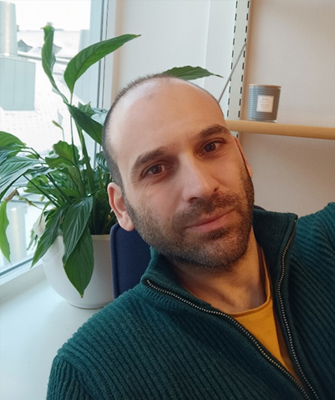
Constantinos Xenofontos is a mathematics educator who currently works as an associate professor at Oslo Metropolitan University (Norway). Before taking on this position, he worked at universities in Cyprus and Scotland. He holds a master’s degree and a PhD in mathematics education from the University of Cambridge. His research is mainly concerned with mathematics teacher education (both initial teacher education and continuous professional development), from sociocultural and sociopolitical perspectives. He edited the book Equity in mathematics education: Addressing a changing world, published in 2019 by Information Age Publishing.
1. What’s your earliest memory of doing mathematics?
I grew up in a village in Cyprus in the 80s. Both my parents were working, so my upbringing was surrounded by two female figures – my grandmother and my great-grandmother – who created the most amazing artifacts: woven baskets and knitted blankets, for example. Those artifacts involved decorative patterns. As a child, I was fascinated (and still am) by the mathematical precision and attention to detail of those two women, neither of whom had formal education. The decorative patterns in their crafting would often inspire my own drawings and pattern designing.
2. How has mathematics education changed in the time you have been involved in it?
Nowadays, more and more studies in mathematics education are concerned with sociopolitical issues, like the social construction of success and failure, the extent to which children with minoritised characteristics (gender, disability, sexual orientation, socioeconomic status, immigrant backgrounds, etc.) are supported enough as mathematics learners, and how children’s funds of knowledge (knowledge they bring from home and their communities) can be utilised in mathematics classrooms. Consequently, teacher educators increasingly address sociopolitical issues in their undergraduate classes and in continuous professional development, meaning that a new generation of teachers worldwide is becoming more aware of how to put their ideological intuitions into practice and support the learning of all children. As encouraging as this might be, we still have a long way to go until mathematics classrooms around the world become socially just spaces in which all forms of diversity are handled with equity.
3. Tell me about a time in your career when something totally flabbergasted you.
I completed my PhD in mathematics education quite early, when I was 26. Up to that point, I had no actual teaching experience within classrooms (apart, of course, from the short placement experience I had had as an undergraduate student). Soon after I graduated, I decided to go back to Cyprus and work as a teacher for three years. Due to the fact that the Cypriot educational system is highly centralised and each academic year teachers are allocated to schools by the Ministry of Education, at the time I was given the opportunity to work in different types of schools; for example, in an underprivileged urban area with a high percentage of immigrant pupils, in an elite school in an urban area, and at a rural school of 16 pupils with only two teachers. These experiences have been very valuable in helping me have a comprehensive idea of schools, education, social inequalities, and the need for differentiated teaching and learning that accommodates the demands of pupils and their relevant communities.
4. Do you practise mathematics differently in company?
“Company” for me is the university, and the place to practise mathematics is in my teacher education classes. So, my answer is no. My teaching is informed by research. I believe that (mathematics) education is a political matter. Prospective teachers need to develop an awareness of themselves as political beings and of the interplay between social class, race, gender, and mathematics teaching/learning.
5. Do you think a brilliant maths teacher is born or made?
As a teacher educator, I strongly believe that brilliant mathematics teachers share characteristics that can be developed with effort, practice, and care. Teachers need to acquire a strong knowledge of the subject, be up to date with educational research, use contemporary pedagogical approaches, and, of course, be passionate about helping children to “read and write the world with mathematics” (to quote Eric Gutstein (n. d., p. 1), who extends Paulo Freire’s thought).
6. What’s the most fun a mathematician can have?
It depends on each individual’s interests. In movies, mathematicians are often depicted as idiosyncratic people, distant from the real world. While this may be true of exceptions, most mathematicians I know are, outside the workplace, very cool people with interests like everyone else: they sing or play musical instruments; exercise and do sports; draw or do gardening.
7. Do you have a favourite maths joke?
There are so many mathematical jokes and puns which I find delightfully silly. Like these:
Are monsters good at mathematics? No, unless you Count Dracula.
What do you get when you divide the circumference of the sun by its diameter? Pi in the sky.
References:
Join the conversation: You can tweet us @CambridgeMaths or comment below.